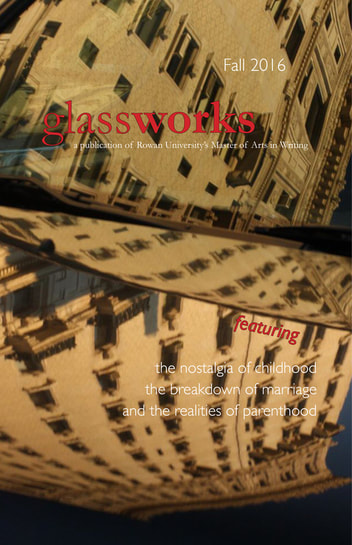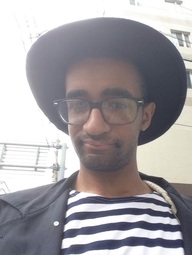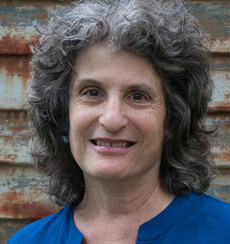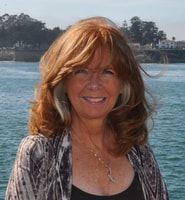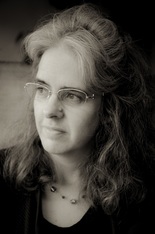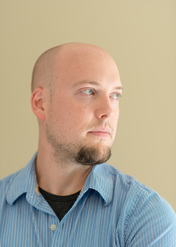|
lookingglass
Through the "Looking Glass," readers are invited to dig deeper into our issues as contributors share reflections on their work. Specifically, "Looking Glass" provides a sort of parlor where authors and artists reveal the genesis of their pieces, as well as provide meta-discursive insight into their textual and visual creative works. Issue 13 Reflections
Read on for reflections by select authors and artists
on the genesis and craft of their pieces in Glassworks and then read the full issue online! |
Kevin Brown
"Hephaestus"
|
As a kid, I was very interested in Greek mythology, especially the Disney movie, Hercules, and its spinoff TV series. So, in a poetry class during undergrad, I came back to mythology when trying to conceive a poem. Many of my poems are inspired by a certain longing, intimacy, which I connected to the intriguing pairing of Aphrodite and Hephaestus. In this poem, I attempted to explore the multi-dimensionality of desire.
|
Emily Weber
"Half Empty"
I wrote "Half Empty" in early 2016 after a long conversation with a friend who was considering using a sperm donor to get pregnant. One of her concerns (and indeed, one of mine) was the role of mental illness in pregnancy and the added weight such a pregnancy would carry. Another concern was her support system, or lack thereof. In the best case scenario, she would struggle to make ends meet and keep herself physically and mentally healthy while raising her child. But what if something went wrong? Who would she turn to if there were complications—or worse?
The story also delves into how art and an artist’s space reflect rich inner worlds. The photography collection and the specific photograph described in the story come from a real collection that I’ve turned to several times for inspiration (though I have left my copy of the book intact).
I’m grateful to the readers who helped me refine a much rougher version of "Half Empty," particularly Erin Rogan and Mitch James.
The story also delves into how art and an artist’s space reflect rich inner worlds. The photography collection and the specific photograph described in the story come from a real collection that I’ve turned to several times for inspiration (though I have left my copy of the book intact).
I’m grateful to the readers who helped me refine a much rougher version of "Half Empty," particularly Erin Rogan and Mitch James.
Joanna White
"Diner"
|
As little kids, we took three summer trips with our parents up the coast from the San Francisco Bay Area to Vancouver to visit family. On one trip, because the temperature was so consistently above 100 degrees and because we were in a station wagon without air-conditioning, we stopped at motels to swim during the day and drove at night. I still remember waking up in the car one night, distressed to find our parents gone, then discovering them in the diner. What I cannot remember, however, is if we actually saw the fried egg on the sidewalk or if we discussed in such vivid detail what would happen if someone tried it, that it became a part of memory.
|
Robert Fillman
"Automat"
|
Whenever I am stumped, or overtired, or feel as though I have nothing left in the well, I'll write an ekphrastic poem, mainly because the original artist has done so much of the legwork for me. It's a kind of crutch I allow myself to indulge every once in a while. "Automat" was inspired by Edward Hopper's 1927 painting of the same name. I have always been fond of Hopper's renderings of women. There's a mystery there, a story that, as a viewer, you feel you have missed out on but nevertheless have a right to know. Hopper's women are often sitting, exposed, faces looking away, usually with a tinge of sadness. In "Automat," we know that the woman has a life and agency of her own, and yet she is in danger of being transformed into the sexualized object of a voyeuristic gaze. What I try to do is give voice to one version of femininity that has been otherwise denied to the woman by the limitations of the visual medium.
"Clarinet Man"
|
Written around the same time, "Clarinet Man" is an attempt at synesthesia. I sought to articulate how it feels to experience a musical performance, both as the performer and as a member of the audience. I was thinking of jazz and its odd time signatures and complex rhythms, which I try to enact formally. But I also wanted to represent the range of tones a skilled musician can achieve with the instrument and, in doing so, shed light on the relationship that develops between the artist and his or her tools.
Zachary Riddle
"Homecoming"
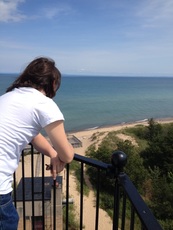
I lost my father twice: first when I was a boy—when he left me, my brother, and my mother to live with my grandparents—and then again after he died very suddenly while I was completing my undergraduate degree. He was buried alongside his first wife and his firstborn son—my half-brother—in a small cemetery in southern Michigan. The winter swallowed me up in its cold dark, and my father started speckling my writing, his image appearing in every short story and poem I conceived.
All of my characters and speakers shared my loss, each one attempting to “find” him in his own way: the speaker of “Homecoming” traverses a version of our world where death is monopolized and worshipped in order to find his father’s grave. So, almost one year later, I followed in my speaker’s footsteps and visited my father’s grave. When I arrived, I discovered that he had been given no tombstone, no marker in the ground to identify where his body rested.
“Homecoming” was a reaction to these feelings of “lostness”—that even though I did what I thought I needed to do, I still was unable to comprehend his loss. Even though our lives are limited, they are even more significant because they are finite: loss can be an intimately, intensely beautiful thing. “Homecoming” was one of the first poems to teach me that loss wasn’t something that we just dealt with—and this is one of the hardest lessons I’ve learned as a writer.
All of my characters and speakers shared my loss, each one attempting to “find” him in his own way: the speaker of “Homecoming” traverses a version of our world where death is monopolized and worshipped in order to find his father’s grave. So, almost one year later, I followed in my speaker’s footsteps and visited my father’s grave. When I arrived, I discovered that he had been given no tombstone, no marker in the ground to identify where his body rested.
“Homecoming” was a reaction to these feelings of “lostness”—that even though I did what I thought I needed to do, I still was unable to comprehend his loss. Even though our lives are limited, they are even more significant because they are finite: loss can be an intimately, intensely beautiful thing. “Homecoming” was one of the first poems to teach me that loss wasn’t something that we just dealt with—and this is one of the hardest lessons I’ve learned as a writer.

